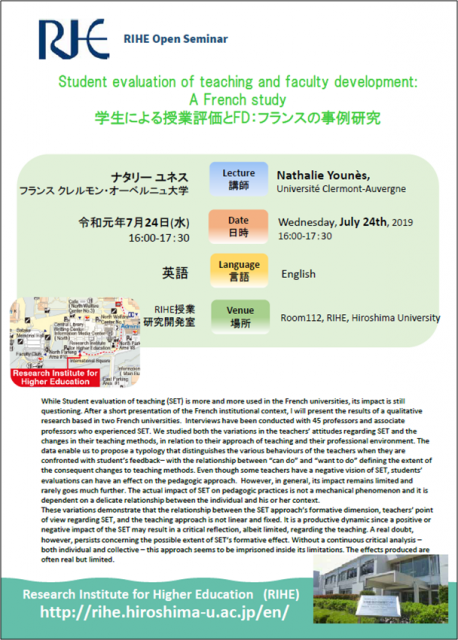The open seminar will be held as follows:
■Date
16:00-17:30, Wednesday, July 24th, 2019
■Theme
Student evaluation of teaching and faculty development: A French study
■Venue
Room No. 112, RIHE, Hiroshima University
■Lecturers
Nathalie Younès, Université Clermont-Auvergne
■Abstract
While Student evaluation of teaching (SET) is more and more used in the French universities, its impact is still questioning. After a short presentation of the French institutional context, I will present the results of a qualitative research based in two French universities. Interviews have been conducted with 45 professors and associate professors who experienced SET. We studied both the variations in the teachers’ attitudes regarding SET and the changes in their teaching methods, in relation to their approach of teaching and their professional environment. The data enable us to propose a typology that distinguishes the various behaviours of the teachers when they are confronted with student’s feedback– with the relationship between “can do” and “want to do” defining the extent of the consequent changes to teaching methods. Even though some teachers have a negative vision of SET, students’ evaluations can have an effect on the pedagogic approach. However, in general, its impact remains limited and rarely goes much further. The actual impact of SET on pedagogic practices is not a mechanical phenomenon and it is dependent on a delicate relationship between the individual and his or her context. These variations demonstrate that the relationship between the SET approach’s formative dimension, teachers’ point of view regarding SET, and the teaching approach is not linear and fixed. It is a productive dynamic since a positive or negative impact of the SET may result in a critical reflection, albeit limited, regarding the teaching. A real doubt, however, persists concerning the possible extent of SET’s formative effect. Without a continuous critical analysis – both individual and collective – this approach seems to be imprisoned inside its limitations. The effects produced are often real but limited.
■Language
English
[trust-form id=19690]

